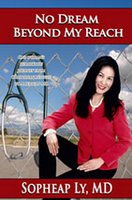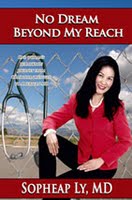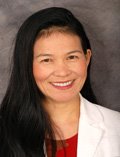
I mentioned the publication of a new book recently, called No Dream Beyond My Reach by
Sopheap Ly. Here's an article about the doctor-cum-author from the University of California's website.
From Child Laborer to American Doctor - by Ioana Patringenaru @UCSD : UCSD physician strives to realize her dreams after a childhood in Cambodia’s Killing Fields
When she was just 5 five years old, Dr. Sopheap Ly was snatched, along with her family, from her home and taken to the Cambodian countryside, where she was forced to work as a child slave laborer. There she endured the loss of her father and her grandparents, and many other hardships. But fast-forward three decades: Ly has become a successful physician at UCSD and the Veterans Affairs San Diego Healthcare System and the mother of twin girls. She has now written a book about her experiences and her struggles to succeed, titled “No Dream Beyond My Reach.” She said she wanted to share her message of hope and inspire others. The book also is a tribute to her father, whom she describes as her role model. “My father told me every day that he loved me more than he could say,” Ly said. Ly’s father often said he hoped she would work in the medical field. The drive to realize that dream is what kept her going through all the trials she faced, she said. She also said she believes his legacy passed on to her through his genes, which gave her a strong constitution and the ability to withstand hardship. Ly’s father was a professor in Cambodia and always put an emphasis on education. The family’s life was full of visits with other family members and shopping trips. Ly remembers that her father was very affectionate with her. He always advised her to study and strive to reach her dreams, she writes.
Ly's happy childhood came to an end late one night in 1975, when she was five. Khmer Rouge soldiers forced her, her parents, her younger sister and her aunt to leave their home at gunpoint. They were herded onto a train that was headed to the countryside, its passengers stuck together like matchsticks. To this day, Ly said she can still hear the cries of hungry babies and scared children on that ride, which lasted one day and one night. “I was very scared,” she recalled. Her destination was Cambodia’s rice fields, where Ly said she entered the world of slave labor. She was made to work 14 hours a day, seven days a week, while her parents worked 18 hours a day. The family lived in a crude hut made of coconut and bamboo. Every few months, the monsoon’s torrential rains would wash away their shelter and they would have to rebuild. Hunger also was a constant companion. The family received one meal a day, made of watery rice and rotten vegetables. They learned to trap and roast rats to get some protein in their diet. “As I lay on my bamboo bed late at night, I wondered why this awful nightmare was happening to me, to our family, to everyone I loved and cared about,” Ly writes in her book.
Losing loved ones
Her grandparents didn’t survive. They chose not to eat rats in accordance to their Buddhist faith, Ly said. After a while, they couldn’t stand up, couldn’t talk and couldn’t recognize their grandchildren. Looking back, Ly said her grandparents looked much like some of the patients she saw in hospitals’ intensive-care units. Their skin had shrunk and their eyes were sunken. One day, she came home to see her mother and aunt burying her grandparents in a shallow grave, because they didn’t have the strength to dig a deeper one. “My sister and I sat on the broken steps of our bamboo bed feeling helpless, confused and lost in our sadness,” she wrote in her book. She and her sister usually waited for their mother and father to come home. One day, their father didn’t return. They waited for him for several days—to no avail. The family later learned that Ly’s father had been beheaded. As a professor, he was an intellectual and the Khmer Rouge considered him an enemy to their regime. Ly was just 7 years old. “When I realized that I would never see him again, I cried for days,” she wrote. “All I had were memories of his love and his words.” From then on, Ly sustained herself through every challenge by remembering her father’s words: “Never give up on your dream,” he would say. “It is never beyond your reach.”
Life after the war
After four years in the killing fields, Ly and what remained of her family were finally allowed to leave, when Vietnamese troops defeated the Khmer Rouge. But their home and their livelihoods were gone. They lived in poverty. Ly, now 9, worked at a swap meet. She was able to go to school. But her relatives feared for their country’s stability and decided to leave Cambodia for Thailand. They hired a smuggler to take them to a Thai refugee camp. The walk through a lush, tropical rain forest made Ly’s heart ache. “I was really sad,” she said. “I really missed my country.” The group was soon stopped by soldiers, but they were let go. Over the next four years, between 1983 and 1987, Ly and her family lived in three different refugee camps in Thailand and the Philippines, sometimes in conditions that brought back to mind her time in Cambodia’s rice fields.
Coming to America
Finally, at age 16, she was able to come to the United States. Ly remembers being shocked by the sight of homeless men and women living on the streets. “I learned right away that in America I would have to work very hard to achieve my dreams, lest I too fall in a slump and find myself living curbside,” she wrote. Over the next two decades, Ly would juggle jobs and studies, working her way through high school, college, medical school and finally her residency. Every time money was short or she was tired, or both, Ly remembered her father’s encouraging words and soldiered on. “Every time I encountered hardship, I remembered I wanted my dad’s dream to come true,” she said. When she finally walked onto the stage at Howard University to collect her medical school diploma and shake the dean’s hand, she remembers thinking her father was watching her from above. She now jokes she hopes he didn’t get a bill in heaven for all her student loans.
Building a family and a career
Last year, Ly became an assistant professor of medicine at UCSD and a physician in San Diego’s VA system. She works with war veterans suffering from PTSD. “I’ve always loved education all my life,” she said. “This job is very important to me.” Ly credits support from her friends for her success. At Howard University’s College of Medicine, she met Dr. Aretha Makia, a fellow medical student and a former Miss Cameroon. The two struck a fast friendship that endures to this day. Ly says she considers Makia her best friend on the East Coast. On the West Coast, her best friend is Dr. Grace Lee, a dentist, who lost her mother as a teenager. Makia gave birth to two sons while in medical school; Lee gave birth to a son and a daughter while studying at UCLA’s School of Dentistry—and Ly said she admires both women for it. Ly herself became the mother of twin girls last year. As a parent, she said she hopes to be as good to her children as her father was to her. She has written a rhyme to summarize her hopes and dreams for her girls: "I have a dream for my twins to see bigger than their own vision, a much bigger horizon, set a higher bar and reach the stars,” it goes.
Labels: No Dream Beyond My Reach, Sopheap Ly
 Book Review
Book Review


